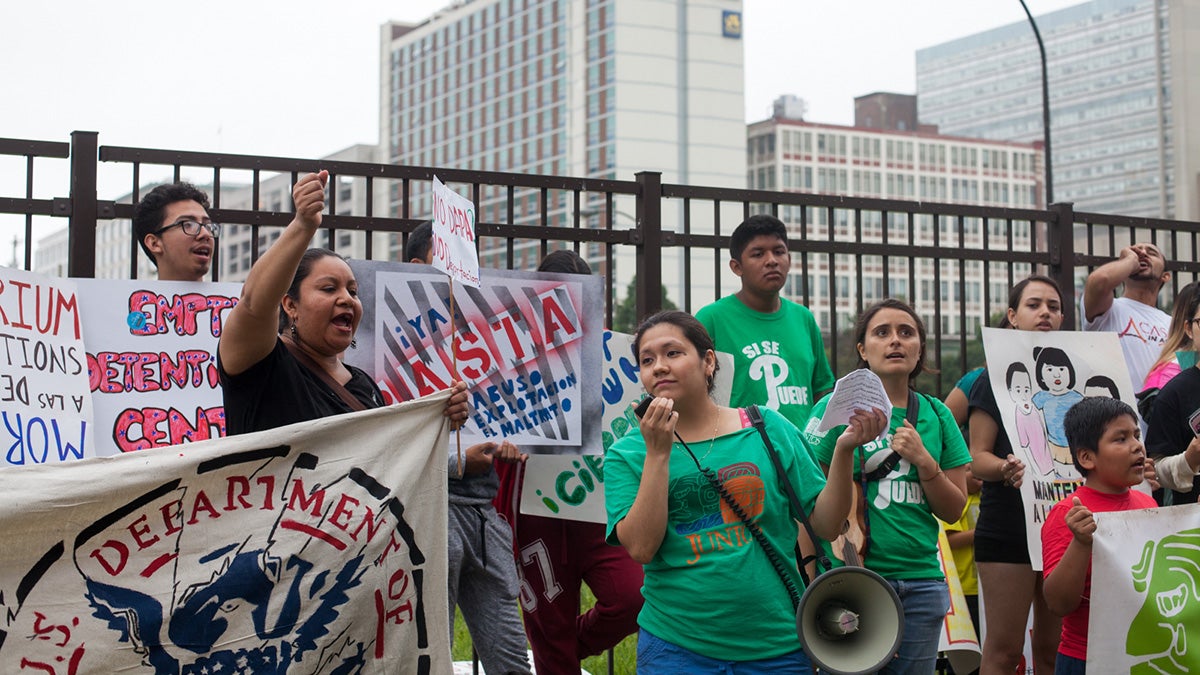I know the dangers of cooperating with ICE. The DA race could bring them back
Immigration activist Erika Almirón on why Philadelphia should not return to cooperating with ICE, something DA candidate Carlos Vega has said he will do.

Immigrants rights groups gathered outside of the Philadelphia ICE Office to protest immigration policy. (Brad Larrison for WHYY)
Philadelphia’s Black and brown immigrant communities got notice of a looming threat last week.
During a televised debate, Carlos Vega, the homicide prosecutor who is challenging incumbent Larry Krasner in the upcoming election for district attorney, admitted that he would reverse a huge victory that immigrant communities and advocates won in 2018 — the ending of Philly police sharing data with Immigration and Customs Enforcement.
When asked during the debate about enforcement of immigration laws, Vega was clear. If elected, he would reinstate the city’s collaboration with ICE.
“If the federal government comes in and wants to lend a helping hand, then so be it,” he said.
When asked about handing over information to ICE, he didn’t hesitate. “If it’s the information as to a defendant, they don’t have to ask for that. That’s in the computer banks of the police department already,” replied Vega.
While that information and data might be available within the city’s police department, it’s not actually accessible to ICE and hasn’t been for several years. That cooperation between the two agencies mostly ended in 2018, when the District Attorney and the Mayor’s office agreed to stop sharing real-time arrest data with ICE, through the system known as PARS.
Carlos Vega says if an undocumented person is accused of a crime, he will hand them over to ICE.
Krasner broke the data sharing contract with ICE and has worked to protect immigrants.
The difference couldn’t be starker. https://t.co/uPJvBAKpft
— Rick Krajewski (@rick4westphilly) May 6, 2021
Rolling back that win would be incredibly dangerous to all of the communities of color in this city — especially immigrant communities, which comprise 15% of the overall population of Philadelphia.
Whoever wins in the 2021 primary or general elections for district attorney, and in 2023’s mayoral election, must not restart this dangerous collaboration with what remains an out-of-control agency.
Vega was specifically asked if he would give police arrest information to ICE and he said “I have to, I have to follow the law.”
But a judge has already ruled that’s not true.
While ICE officials can look at anything that’s in the public record, it’s up to the mayor, the DA, and the president judge of the court whether ICE also gets access to PARS, an up-to-the-minute database of Philadelphia’s police arrests that includes lots of additional info about arrestees.
Prior to 2018, ICE would use their access to this database to find targets for their destructive raids, often going after people who had done nothing wrong. I saw it happen as the executive director of Juntos, a community-led Latino immigrant organization fighting for immigration rights, all the time.
I was once called to the scene of an arrest involving a Latino man, to help protect his rights. I did what I could. The next day, a young pregnant woman was in my office — she lived with the man who had been arrested, but she had not been at the site of the arrest. ICE had just raided their home and taken into custody her boyfriend — the father of her child — as well as their roommate. Now, she was terrified to go back.
Neither of the men taken had been accused of any crime or done anything wrong. ICE had raided their apartment just because it had been the home address of the man who was arrested, a man ICE suspected was an undocumented immigrant and figured might live with other undocumented people. This kind of thing would happen all the time. ICE would use PARS to go after the family of arrestees or target people who were arrested but never charged — in other words, innocent.
For years, Juntos and many other advocates for the immigrant community fought to get the city to end its cooperation with ICE. In 2018, with stories of caged children and families ripped apart dominating the news, more people began to understand how out of control the agency had become. Our protest actions became louder and larger than ever before. It was no longer just our long-time Latino activists in the streets. We were joined by other communities of color, who had their own deep experience with rogue agencies like ICE and city police criminalizing whole communities. These other Black and brown communities, as well as our white allies, flooded into the streets to show their support for change — and it worked.
District attorney Larry DA Krasner and Mayor Kenney agreed to not renew the contract with ICE to share PARS data.
Soon after the city ended the PARS agreement, community members told us that the number of ICE raids dropped dramatically. Not having access to that data didn’t end ICE’s reach into our community — but it threw a large enough wrench into their machine and it stopped many families from being separated.
We cannot go back to our communities being targets of criminalization and we cannot go back to policies that allow for ICE collaboration in Philadelphia. It’s critical for all voters to consider the high stakes of this election and the way it might potentially impact our city’s immigrant communities.
The role of district attorney will shape policy around policing and immigration enforcement in Philadelphia for years to come. A candidate’s race, ethnicity or slogans are not enough to know whether they are on our side. We need to hold people in office, or those seeking office, accountable to really doing what’s best for our communities.
Erika Almirón is a longtime activist, the former executive director of Juntos and a former candidate for City Council.
WHYY is your source for fact-based, in-depth journalism and information. As a nonprofit organization, we rely on financial support from readers like you. Please give today.







